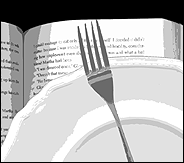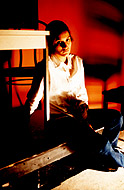on campus
Of course: Stirring the pot
 ILLUSTRATION: TZIGANE
ILLUSTRATION: TZIGANE
| |
McGill has no culinary school, but it does offer a course in food appreciation; that is, an appreciation of how the preparation and consumption of food, as depicted in literature, helps develop a character or set a scene, both in fiction and non-fiction.
English professor Nathalie Cooke — no pun intended — developed this course out of an interest in "the literature of the domestic," both as it applies to the "story of the home" and "to the story of the woman in the home."
Students read, for instance, Alice Munro's short story, Half a Grapefruit, where the "hoity toity" protagonist is "what she says she eats," maintaining that she eats a half-grapefruit for breakfast, not the banal truth of toast or cereal, explains Cooke. They also read Laura Esquivel's Like Water for Chocolate, where the heroine "is what she cooks," incorporating the petals of roses she was given into her recipe for quail.
To give her 60 students some background on the domestic sphere, Cooke has them read such books as historian Schwartz Cowan's More Work for Mother and Home by former McGill architecture professor Wytold Rybczynski.
She also has them read excerpts from cookbooks such as The Home Cook Book, published in 1877. "A cookbook can tell a story," says Cooke, who says she is "learning to read on a slant" (decode the stories told implicitly, such as a woman's relationship to her family through the preparation of food) while doing the research for her book in progress, Home Cooking: The Story Canadian Cookbooks Have to Tell.
"Cookbooks offer an unmediated record of women's daily life, and they chronicle the country's social history," Cooke is quoted as saying in an article published last December in The Hamilton Spectator.
Students too are required to "read on a slant," or read between the lines, to figure out, for instance, just what the advent of the cake mix did to women's roles. That was one group's choice for their "food fashions/food figures" project which involved creating an exhibition as well as a critique. Other subjects included Aunt Jemima and Jell-O.
Brain Awareness Week returns

| |
Montreal has long been a leader in neuroscience research. Now, for the third year in a row, the fruits of Montreal's neuroscience knowledge will be offered to the general public — in a comprehensible and easily digestible form.
Brain Awareness Week is an annual information campaign designed to teach the public about how the brain functions and to highlight recent developments in neurological research.
Originally developed in the U.S., graduate students from the Douglas Hospital Research Centre brought Brain Awareness Week to Montreal in 1998. It began as a grass-roots initiative in which a small number of McGill students offered introductory neurology lessons to Montreal-area elementary and high school students. Since then, Brain Awareness Week has grown to include neuroscience presentations by 70 volunteers from three different universities that will be given at an estimated 100 Montreal schools, as well as a three-part public lecture series.
While elementary school presentations consist of interactive activities that use the five senses as a model of brain function, high school seminars focus on the effects that drugs have on the central nervous system. Emma Spreekmeester, a PhD candidate in neurology and one of the organizers of Brain Awareness Week in Montreal, says she uses "a non-judgemental" style of teaching.
Rather than just saying "don't do drugs," Spreekmeester describes the particular long-term effects that drugs have on the brain and details the physiological processes by which they become addictive. Drugs tend to lose much of their appeal by the time she's done.
Students from McGill, Concordia and the Université de Montréal will visit Montreal schools to talk about the brain from March 13 to 17. The Brain Awareness Week public seminar series will be held at the Université de Montréal on March 21 with lectures to be given at McGill on the 22nd and 23rd.
Jeans for the dean, tie for the student guy
 Jason Parente and Alan Shaver
Jason Parente and Alan Shaver
PHOTO: OWEN EGAN | |
Jason Parente was impressed by the fellow who accompanied him to his international business class — his guest nailed the question about why the gold standard had been used as the exchange system.
But the new student, a chemistry specialist, "wasn't taking many notes." Rather, "he was listening, trying to analyse the class," said the second year immunology-microbiology student, minoring in management.
Sound like a strange thing to do? Not if, on most days, you're the dean of science. Alan Shaver, clad in jeans, spent one day last week in Parente's running shoes: going to his classes and hanging out in the Science Undergraduates' Society lounge.
The next day, Parente would do just the opposite, donning a suit and tie alongside Shaver, and observing while the dean negotiated the terms of hiring with a new faculty member and chaired the budget meeting.
The "take a walk in the other guy's shoes" exercise was the second annual Dean/Student-For-a-Day fundraising event. After purchasing his one-dollar raffle ticket, Parente was chosen to fill the dean's shoes. The money was raised for Gilda's Club, an organization that offers support to cancer patients and their families.
Shaver enjoys the event. This morning in the student lounge, he's listening to students' viewpoints on marking schemes. "That sort of exchange helps me do my job better."
His attendance at a class on computer programming, however, did not. "It was a lot of words that didn't mean anything," he says. "Much like the budget vocabulary was for Jason. You definitely needed an introductory course."
Parente, for his part, gained an appreciation of "how much work" it is being the dean. "There's lots of talk and discussing and now I can see why." Parente witnessed, for example, part of the process of hiring a new faculty member. "I thought it was simply done by the department. But no, it has to go to the dean and the vice-principal; it really astounded me."
Curtain's up on McGill Drama Festival
 Shaytaan's Corner actress Tara Rihal
Shaytaan's Corner actress Tara Rihal
| |
For theatre buffs with a yen for young and original theatre, there's a marathon of student-written,-directed and -acted plays now running at the Player's Theatre. The McGill Drama Festival, now in its 12th year, offers the possibility of seeing six plays between now and March 18, all for the paltry sum of $10.
Michal Zilberman, vice-president, publicity, of the Player's Theatre, will be conducting The Sophists, written by Kelly Canavan. "It's a little comedy about two students who accidentally kill their roommate," says Zilberman, who has a particular interest in directing. "It's zany and makes some profound statements about the existential state of life."
On a more serious note is Shaytaan's Corner, by Hadar Talib. Set in 1975 in the Middle East, with a backdrop involving a human brain in a jar, a ghost raised from the dead and a government set against its people, the hero, Said, is faced with "a climactic decision," reads the program flyer.
All the plays, save Call of the Waitress (A Play in Three Phonecalls), are by McGill students. When Waitress, written by Concordia University student Joel Fishbane, was one of the six plays selected from the 12 submitted, Player's Theatre agreed to stage it provided the actors were from McGill.
"We made a rule this year that the directors have to have a McGill cast," says Zilberman, explaining that Concordia has a larger theatre program and more opportunity for acting than does McGill.
Every year, the festival invites a guest theatre person to select the plays. This year it was University of Toronto theatre professor Mark Levene.
Zilberman considers the Player's Theatre "a goldmine of opportunities," and laments the fact that it isn't better known. People "feel they can't get involved because they're not in film, theatre or English," she says. But she, a computer science student, is proof that that's not the case.
The festival continues until March 18, every night except Sunday, at 8 pm, at the Player's Theatre in the Student Services Building. For reservations, call 398-6813. Adults $8, Students/Seniors $6, Festival Pass $10.

